Horizontal European Union Programmes
This section presents the main horizontal European Union programmes accessible to Bonaire, St. Eustatius, and Saba. For each program, you can read about the specific requirements. These vary from program to program.
Theme: Social Inclusion & Integration
Asylum, Migration, and Integration
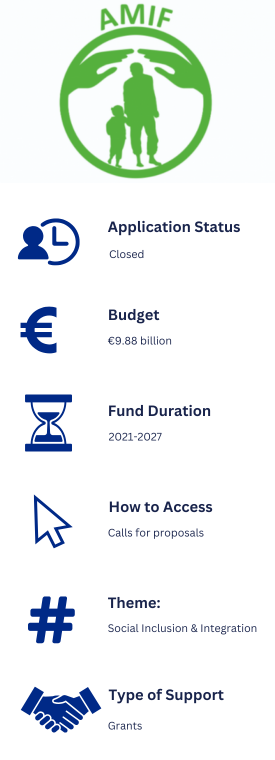
The Asylum, Migration, and Integration Fund has a specific focus on early integration measures, with a possibility for higher-than-standard co-financing rate for local and regional authorities, and civil society. The new programme predominantly focuses on early stages of integration and the overall aims are the following: Developing and fostering the Common European Asylum System, including its external dimension; Supporting legal migration to the Member States and facilitating the integration of third-country nationals; Reducing irregular migration and improving the effectiveness of return and re-admission in third countries; Enhancing solidarity and fair sharing of responsibility between the Member States.
Who Can Apply?
Legal organizations established in a Member State participating in the AMIF or established in third countries associated with the AMIF can participate in the calls for proposals for instance:
- State and federal authorities
- Local public bodies
- Non-governmental organisations
- Humanitarian organisations
- Private and public law companies
- Education and research organisations
More information about the Asylum, Migration, and Integration Fund and call for proposals for the Asylum, Migration, and Integration Fund.
Theme: Biodiversity & Ecosystems
BESTLIFE2030
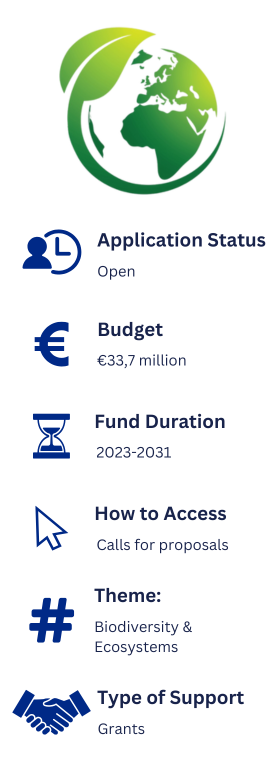
Apply Now: BESTLIFE 2030 Second Call for Proposals!
The BESTLIFE2030 Programme is seeking innovative conservation projects to protect biodiveristy. Apply by May 30, 2025 for funding opportunities, and see this link for more information.
BEST 2.0 is a voluntary scheme for Biodiversity and Ecosystem Services in the Territories of European overseas and aims to support the conservation of biodiversity and sustainable use of ecosystem services, including ecosystem-based approaches to climate change adaptation and mitigation in the EU Outermost Regions (ORs) and Overseas Countries and Territories (OCTs).
The European Commission expressed its willingness to develop a specific programme to help the OCTs conserve their environment and biodiversity. Due to OCTs' limited access to the LIFE programme, the BEST 2.0 programme was developed. It is financed under the Development Cooperation Instrument (DCI), which is one of the EU funding instruments for cooperation and external aid.
Who Can Apply?
The EU Outermost Regions (ORs) and Overseas Countries and Territories (OCTs) include 34 political entities.
More information about BEST 2.0 and call for proposals for BEST 2.0.
Theme: Rights & Freedom
Citizens, Equality, Rights and Values Programme
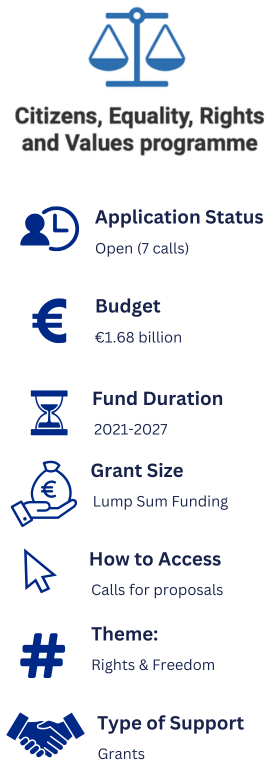
The objective of the Citizens, Equality, Rights and Values programme is to protect and promote rights and values as enshrined in the EU Treaties and the Charter of Fundamental Rights, in particular by supporting civil society organisations active at local, regional, national and transnational levels. It aims to sustain and develop open, rights-based, democratic, equal and inclusive societies based on the rule of law. This includes a vibrant and empowered civil society, encouraging people’s democratic, civic and social participation, and cultivating the rich diversity of European society, based on our common values, history and memory.
The programme is based on four strands:
- Equality, Rights and Gender Equality – promoting rights, non-discrimination, and equality (including gender equality), and advancing gender and non-discrimination mainstreaming.
-
Citizens’ engagement and participation – promoting citizens engagement and participation in the democratic life of the Union, exchanges between citizens of different Member States, and raising awareness of the common European history.
3. Daphne – fighting violence, including gender-based violence.
4. Union values – protect and promote Union values
More information about the Citizens, Equality, Rights and Values Programme and calls for proposals for the Citizens, Equality, Rights and Values programme.
Theme: Employment & Labour Market
Connecting Europe Facility
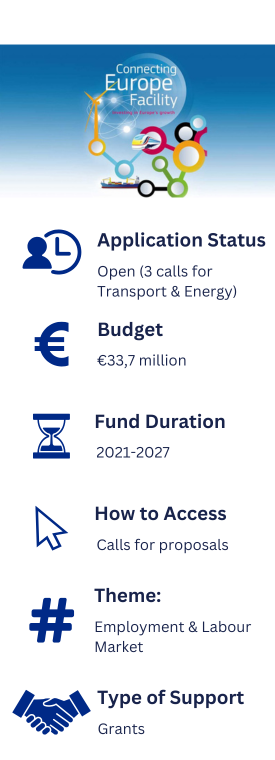
The Connecting Europe Facility (CEF) is a key EU funding instrument to promote growth, jobs and competitiveness through targeted infrastructure investment at the European level. It supports the development of high-performing, sustainable and efficiently interconnected trans-European networks in the fields of transport, energy, and digital services. CEF investments fill the missing links in Europe’s energy, transport, and digital backbone.
The CEF benefits people across all Member States, as it makes travel easier and more sustainable, enhances Europe’s energy security while enabling wider use of renewables, and it facilitates cross-border interaction between public administrations, businesses and citizens.
The CEF is divided into three sectors:
- Transport
- Energy
- Digital
One of the key priorities of CEF is enabling and strengthening the synergies between the three sectors. Actions across sectors may enable costs and results to be optimised through the pooling of financial, technical or human resources, thus enhancing the effectiveness of EU funding.
More information about the Connecting Europe Facility, call for proposal for Connecting Europe Facility - Transport & Energy, and call for the Connecting Europe Facility - Digital.
Theme: Employment & Labour Market
COSME-WORTH Project
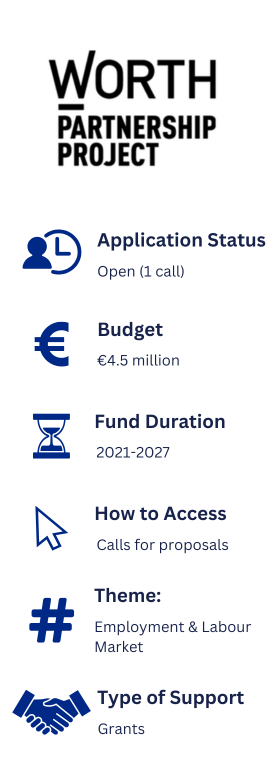
The WORTH Partnership Project supports creative sector SMEs to collaborate transnationally with a view to developing innovative design-driven products by stimulating exchange and partnership between creatives, designers, manufacturers, crafters, and technology firms. It is based on key principles such as quality of experience, including style and aesthetics, healthy and safe living environments, sustainability and circularity as well as inclusion, accessibility and affordability. Launched in 2021, WORTH II follows the success of the first edition (2017-2021). 200 transnational partnerships will be selected in three calls for proposals.
The WORTH Partnership Project is funded by the European Commission under COSME, the EU Programme for the competitiveness of Small and Medium-sized Enterprises. WORTH is the sole European project where designers, SMEs, manufacturers, and tech providers work together to develop innovative, design-oriented business ideas.The project focuses on lifestyle industries, including fashion and textiles, footwear, leather and fur, furniture/home decoration/interior design, jewellery and accessories.
The project provides companies with an incubation programme to develop new businesses, including a) €10.000 to €20.000 in financial support; b) coaching on business strategy and technology development; c) legal advice on intellectual property rights and protection; d) participation in exhibitions; e) networking and professional links. Transnational partnerships will be selected in three calls for proposals, involving partners from EU-27, UK and COSME countries.
Who Can Apply?
- Both the lead applicants and partners should be active in lifestyle industry sectors such as textile/fashion, footwear, leather ,fur, furniture, home decoration, interior design, architecture, jewellery, and accessories
- They should pursue business activities such as design, manufacturing,craftsmanship or technology development
- They must be established in an EU country, in a COSME associated country or in the United Kingdom.
- Universities, research organisations, or design labs can also participate if justified and relevant to the project
More information about the WORTH Partnership Project, and calls for proposals for the WORTH Partnership Project.
Theme: Culture & Media
Creative Europe Programme
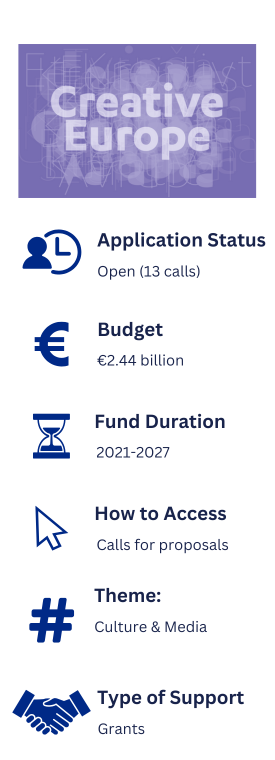
The Creative Europe Programme safeguards and promotes Europe’s cultural and linguistic diversity, the product of centuries of cross-cultural interaction, influences, and migration.
Creative Europe Programme's stated aims include:
- Support the creation of European works and help the cultural and creative sectors seize the opportunities of the digital age and globalization in order to reach their economic potential. This contributes to sustainable growth, jobs, and social cohesion;
- Promote the competitiveness and innovation of the European audiovisual industry and help Europe’s culture and media sectors access new international opportunities, markets, and audiences;
- Promote cross-sectoral innovative actions and diverse, independent, and pluralistic media.
The Creative Europe programme is divided into three strands:
1. Cultural Strand
The Culture strand of the Creative Europe programme supports a wide range of cultural and creative sectors including, among others,
- Architecture
- Cultural heritage
- Design
- Literature and publishing
- Music
- Performing arts
2. Media Strand
The MEDIA strand of the Creative Europe Programme supports the European film and audiovisual industries to develop, distribute and promote European works, taking into account today’s digital environment. In addition, it
- Encourages cooperation across the value chain of the audiovisual industry and at EU level in order to scale up enterprises and European content globally
- Nurtures talents – wherever they come from
- Engages with audiences of all ages, especially the younger generations
To ensure more flexibility in the actions supported and to encourage cooperation among the different parts of the audiovisual value-chain, the priorities of the 2021-2027 Creative Europe Programme are structured around four clusters.
3. Cross-Cultural Strand
The CROSS-SECTORAL strand aims at reinforcing collaboration between different cultural and creative sectors, in order to help them address the common challenges they face and find innovative new solutions. This is achieved for instance through policy cooperation, the services provided by the Creative Europe desks, and the Creative Innovation Lab.
Through the Creative Innovation Lab action, Creative Europe wants to encourage innovative approaches to content creation, access, distribution, and promotion across the cultural and creative sectors, as well as with other sectors. Such approaches shall take the digital transition into account and cover both market and non-market dimensions.
The Creative Innovation Lab aims to:
- Incentivise players from different cultural and creative sectors to design and test innovative digital solutions with long-term positive impact
- Ease the creation of innovative, close-to-market tools, models and methods for the audiovisual sector and at least another creative or cultural sector.
Creative Europe Desks are designed to:
- Provide information about and promote the Creative Europe Programme in their country
- Assist the cultural and creative sectors in relation to the programme and provide basic information on other support opportunities
- Stimulate cross-border cooperation within the cultural and creative sectors
- Provide assistance regarding the cultural and creative sectors in participating countries
- Support the Commission in ensuring proper communication and dissemination of the results and impacts of the programme
- Ensure the communication and dissemination of information concerning funding awarded to and results in a participating country.
More information about the Creative Europe Programme, call for proposals for the Creative Europe Programme, call for European cooperation projects, call for Culture and Creativity, and mobility grant - individual artists & cultural professionals (second call).
Theme: Digital Transformation
Digital Europe

The Digital Europe Programme is the first EU programme that aims to accelerate the recovery and drive the digital transformation of Europe. The Programme is part of the next long-term EU budget (the Multiannual Financial Framework) and covers 2021 to 2027. It will provide funding for projects in five crucial areas: supercomputing, artificial intelligence, cybersecurity, advanced digital skills, and ensuring the wide use of digital technologies across the economy and society.
The Programme is fine-tuned to fill the gap between the research of digital technologies and their deployment, and to bring the results of research to the market – for the benefit of Europe’s citizens and businesses, and in particular SMEs. Investments under the Digital Europe Programme support the Union’s twin objectives of a green transition and digital transformation and strengthens the Union’s resilience and strategic autonomy.
In the first two years (2021 and 2022), the Digital Europe Programme will be implemented through four work programmes:
- Digital Europe work programme
- European Digital Innovation Hubs
- Cybersecurity actions
- High Performance Computing
Innovation Hubs
Digital Innovation Hubs help companies take advantage of digital opportunities to improve their processes and products with a view to enhancing their competitiveness. EU funding will be made available for hubs that are already (or will be) supported by their Member States (or regions) in order to increase the impact of public funding. The Digital Europe Programme will increase the capacities of the selected hubs to cover activities with a clear European added value, based on networking the hubs and promoting the transfer of expertise. Member States have an essential role in the selection process of the EDIHs; the initial network of EDIHs will be established from a list of hubs designated by the Member States.
Cybersecurity Actions
As more and more services move online, cybersecurity has become crucial to the digital world. A strong common level of cybersecurity protects us from malicious cyber activities, which threaten our economies and our way of life. The Digital Europe Programme offers a chance to boost the common level of cybersecurity across the EU, underscoring the EU’s Cybersecurity Strategy. The Digital Europe Programme is an investment programme that helps the EU achieve a values-based framework for technology. This includes the GDPR, new proposals on the Directive on Security of Network and Information Systems (NIS), artificial intelligence, and the Digital Services and Digital Markets Acts. It will invest in building European cybersecurity infrastructures – the ‘cyber shield’ - and, will promote the widespread deployment and take-up of state-of-the-art cybersecurity practices and equipment. This is crucial to building the EU’s digital sovereignty, which relies on the integrity and resilience of data infrastructure, networks and communication.
The DIGITAL Europe Programme
The DIGITAL Europe programme aims to build up and strengthen the EU’s supercomputing and data processing capacities, helping us to reach exascale supercomputing – computing power equivalent to the combined capabilities of all mobile phones in the EU - by 2022 or 2023. It aims to reach post-exascale capabilities by 2026/2027. DIGITAL also intends to increase accessibility and broaden the use of supercomputing in areas of public interest such as health, environment, security, and industry, including small and medium-sized enterprises.
More information about the Digital Europe Programme and call for proposals for the Digital Europe Programme.
Theme: Education & Social Inclusion
Erasmus+
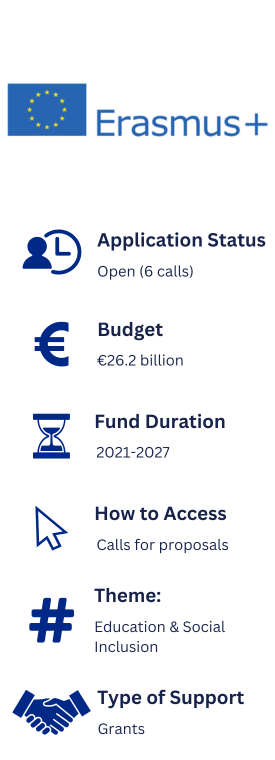
Erasmus+ is the European funding program that provides grants for a wide range of actions and activities in the fields of education, training, youth and sport. This programme places a strong focus on social inclusion, the green and digital transitions, and the promotion of young people’s participation in democratic life. The aim of this program is to support initiatives and projects that structurally contribute to the quality of the European knowledge infrastructure. The program provides opportunities to students, trainees, staff, and volunteers to spend time abroad to enhance their skills and employability. It also supports organizations to work in transnational partnership and to share innovative practices in the fields of education, training and youth.
Who Can Apply?
Applicants must be established in an EU Member State or a third country associated with the Erasmus+ programme. Organisations must be active in the fields of education, training and youth. Mobility activities involve a minimum of two participating organisations (at least one sending and at least one receiving organisation) from different countries.
More information about Erasmus+, call for proposals for Erasmus+, and online events with Erasmus+.
Theme: Health & Social Care
EU4 Health
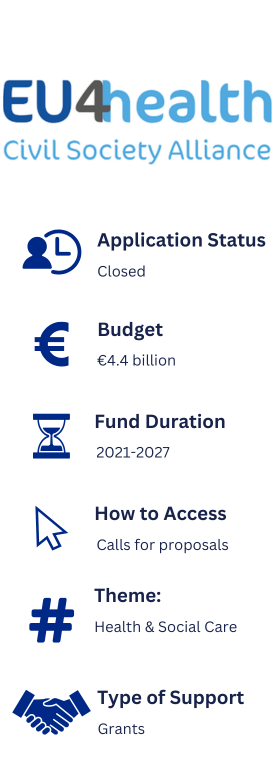
EU4 Health is the fourth and largest of the EU health programmes. The EU4 Health programme goes beyond an ambitious response to the COVID-19 crisis to address the resilience of European healthcare systems. The programme provides funding to national authorities, health organisations and other bodies through grants and public procurement, contributing to a healthier Europe.HaDEA implements the EU4Health programme by managing calls for proposals and tenders from 2021 to 2027.
The EU4Health programme is a key pillar of the Commission’s work to strengthen the European Health Union and contribute to the EU’s health priorities. The actions funded under the EU4Health programme pursue the following 4 goals and 10 specific objectives:
- To improve and foster health in the Union
- disease prevention & health promotion
- international health initiatives & cooperation
2. To tackle cross-border health threats
- prevention, preparedness & response to cross-border health threat
- complement national stockpiling of essential crisis-relevant product
- establishing a reserve of medical, healthcare & support staff
3. To improve medicinal products, medical devices and crisis-relevant products
- making medicinal products, medical devices and crisis-relevant products available and affordable
4. To strengthen health systems, their resilience and resource efficiency
- strengthening health data, digital tools & services, digital transformation of healthcare
- improving access to healthcare
- developing and implementing EU health legislation and evidence-based decision making
- integrated work among national health systems
EU4Health will also be investing in urgent health priorities:
- Response to COVID-19 pandemic and resilience for cross-border health threats
- Europe’s Beating Cancer Plan
- The Pharmaceutical Strategy for Europe and other areas:
- The digitalisation of health systems
- Antimicrobial resistance
- Improved vaccination rates
Who Can Apply?
The EU4Health Programme will provide funding to eligible legal entities from the Member States, third countries associated to it, or listed in the annual work programme created under Union law or an international organisation such as health organisations, non-governmental organisations (NGOs), the private sector and other eligible legal entities.
More information about EU4 Health and calls for proposals for EU4 Health.
Theme: Social Inclusion
European Social Fund Plus
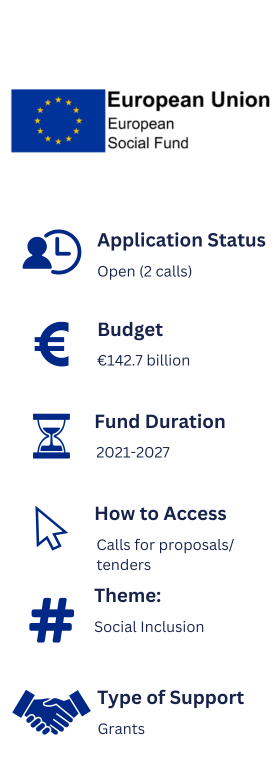
The European Social Fund Plus (ESF+) is Europe’s main instrument for investing in people. The ESF+ will continue to provide an important contribution to the EU’s employment, social, education and skills policies, including structural reforms in these areas. The Fund will also be one of the cornerstones of EU socio-economic recovery from the coronavirus pandemic. The pandemic has reversed gains in labour participation, challenged educational and health systems and increased inequalities. ESF+ will be one of the key EU instruments helping Member States to address these challenges.
Priority will be given to:
- Supporting young people to find a qualification, a good quality job, and improve their education and training
- Helping children in need
- Reskilling and upskilling people for the transition to a green and digital economy
- Capacity building for social partners and civil society organisations
- Transnational cooperation for promoting social innovation across the EU
- Direct support to social innovation through the Employment and Social Innovation (EaSI) strand
The ESF+ brings together four funding instruments that were separate in the programming period 2014-2020: The European Social Fund (ESF), the Fund for European Aid to the most Deprived (FEAD), the Youth Employment Initiative and the European Programme for Employment and Social Innovation (EaSI).
Who Can Apply?
For the investments implemented by Member States in partnership with the European Commission, consult the ESF+ website of your country. To apply for EaSI grants, individuals and organisations have to be either from the EU, or from non EU countries which have an agreement for participation in EaSI. International organisations and legal entities created under Union law can also apply.
More information about the ESF+ and call for proposals for the ESF+.
Theme: Social Inclusion
European Solidarity Corps
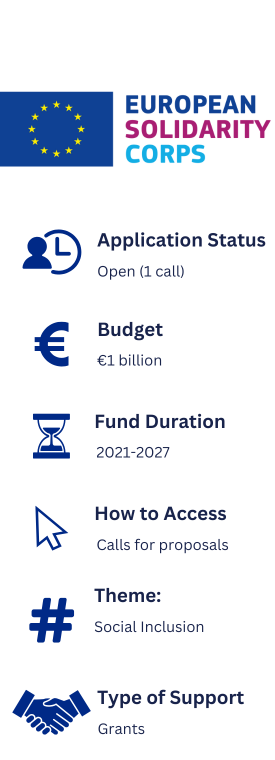
A Solidarity Project is a non-profit solidarity activity initiated, developed and implemented by young people themselves for a period from 2 to 12 months. A project involves a group of a minimum of five young people to focus on a clearly identified topic which they will explore through daily activities that involve all the members of the group. Solidarity Projects address key challenges within the communities, where relevant including those identified jointly in the border regions which should also provide clear European added value.
Strands under this programme:
- Volunteering
- Traineeships (whereas traineeships can still run this year, funded by the budget from the previous programme; please be aware that in the new programme 2021-2027 they are discontinued)
- Jobs (whereas jobs can still run this year funded by the budget from the previous programme, please be aware that in the new programme 2021-2027 they are discontinued)
- Local solidarity projects
These can be in a wide range of fields – education and training, citizenship and democratic participation, environment and natural protection, migration, culture, and many others.
Who Can Apply?
All European citizens aged between 18 and 30 can participate in the European Solidarity Corps. Any public or private entity whether non-profit or for-profit making, local, regional, national, or international may apply for funding under the European Solidarity Corps. In addition, groups of young people registered in the European Solidarity Corps Portal, may apply for funding for Solidarity Projects.
More information about the European Solidarity Corps and calls for proposals for the European Solidarity Corps.
Theme: Research & Innovation
Horizon Europe
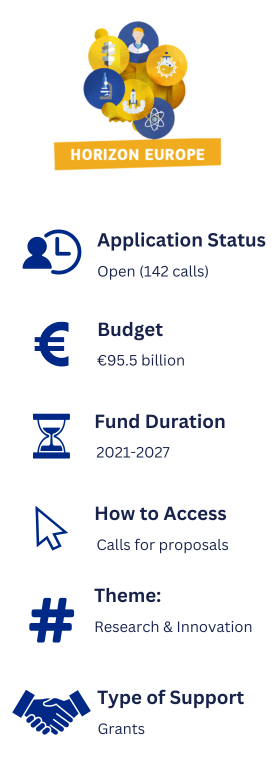
Horizon Europe is the EU’s key funding programme for research and innovation. It tackles climate change, helps to achieve the UN’s Sustainable Development Goals and boosts the EU’s competitiveness and growth. The programme facilitates collaboration and strengthens the impact of research and innovation in developing, supporting and implementing EU policies while tackling global challenges. It supports the creation and dissemination of excellent knowledge and technologies. It creates jobs, fully engages the EU’s talent pool, boosts economic growth, promotes industrial competitiveness and optimises the impact of investments within a strengthened European Research Area.
Who Can Apply?
Legal entities from the EU and associated countries can participate.
More information about Horizon Europe and calls for proposals for Horizon Europe.
Theme: Climate Policy
Innovation Fund
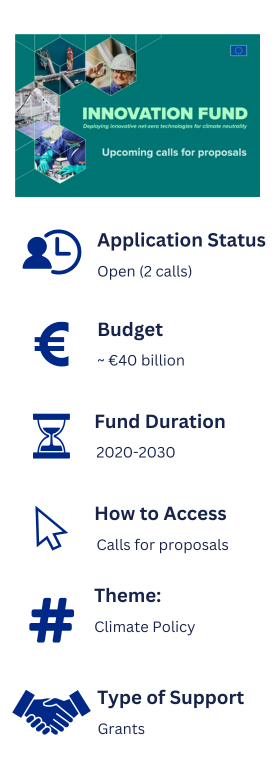
The Innovation Fund is one of the world’s largest funding programmes for the deployment of net-zero and innovative technologies. With a revenue of €40 billion between 2020 and 2030 from the EU Emissions Trading System (ETS), the Innovation Fund aims to create financial incentives for companies and public authorities to invest in cutting-edge low-carbon technologies and support Europe’s transition to climate neutrality. This Fund aims to:
- Help businesses invest in clean energy and industry
- Boost economic growth
- Ceate future-proof jobs
- Reinforce European technological leadership on a global scale.
Who Can Apply?
More information about the Innovation Fund and calls for proposals for the Innovation Fund.
Theme: Public Administration
Interreg Europe
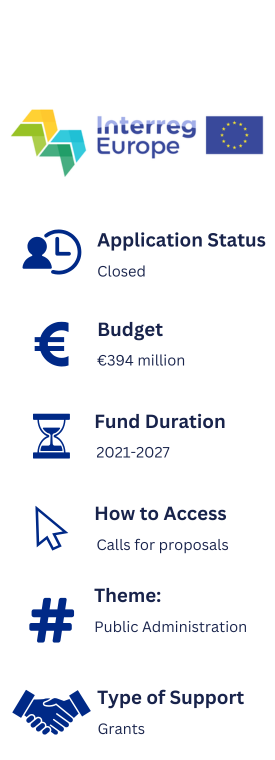
While Interreg Europe is not planning to open any more calls for proposals during the 2021-2027 programming period, the following resources may still provide valuable information and insights for future collaboration opportunities and project planning.
European Territorial Cooperation (ETC), also known as Interreg Europe, is a key component of the European Union that promotes policy cohesion by providing a framework for the implementation of joint actions and policy exchanges between national, regional, and local actors from various Member States. It promotes cross-border cooperation to develop and deliver better policy through programs and projects. Interreg Europe ensures government investments, innovation, and implementation efforts all lead to integrated and sustainable impact for people and place, with the goal of creating an environment and opportunities for sharing solutions and policy learning.
Interreg Europe focuses on three types of beneficiaries to assist:
- Public authorities- local, regional and national
- Managing authorities/ intermediate bodies- in charge of the Investment for Growth and Jobs Programs or European Territorial Cooperation
- Agencies, research institutes, and thematic and non- profit organisations - these types of organisations, although not being the main target, can egnage with their policymakers in order to identify options for collaboration with Interreg Europe
Who Can Apply?
Public authorities
- National, regional, local public authorities
- Other relevant bodies responsible for developing and/ or implementing regional development policies
- Authorities responsible for developing and/ or implementing the Investment for jobs and growth programmes
Organisations relevant for regional development policies
- Business support organisations (development agencies, innovation agencies, chambers of commerce, clusters, etc.)
- Environmental organisations (environmental agencies, energy agencies, NGOs, etc.)
- Education and research institutions (universities, research centres, etc.)
More information about Interreg Europe
Theme: Employment & Labour Market
Invest EU
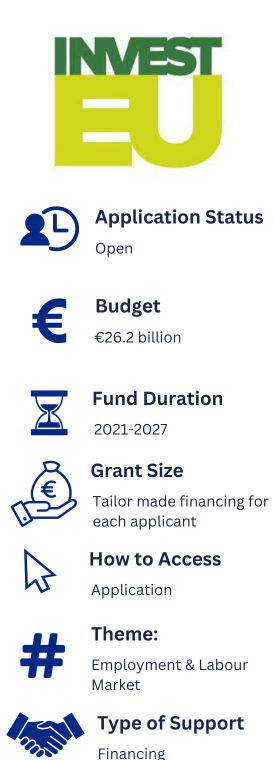
The InvestEU programme was established in response to the COVID-19 pandemic and it is uniquely suited to provide long-term funding to companies while also supporting Union policies following a severe economic and social crisis. The program is a critical support system for businesses in the recovery phase. It also ensures that its original goals continuet to keep investors focused on the EU’s medium- and long-term policy priorities, such as the European Green Deal, the European Green Deal Investment Plan, and the Strategy for Shaping Europe’s Digital Future.
The InvestEU Programme builds on the successful model of the Investment Plan for Europe (the Juncker Plan). It will bring together, under one roof, the European Fund for Strategic Investments and 13 other EU financial instruments.
Who Can Apply?
Members of the European Free Trade Association (EFTA) which are members of the EEA, in accordance with the conditions laid down in the Agreement on the European Economic Area;
- Acceding countries, candidate countries, and potential candidates, in accordance with the general principles and terms for their participation in Union programmes (as established in the respective framework agreements, Association Council decisions or other formalized agreements).
- European Neighbourhood Policy countries, in accordance with the general principles and general terms and conditions for the participation of those countries in Union programmes
- Other third countries, in accordance with the conditions laid down in a specific agreement covering the participation of the third country to any Union programme
More information about InvestEU, FAQ regarding InvestEU, and how to get financing for InvestEU.
Theme: Climate & Environment
LIFE Programme

Join the online LIFE Info Days from May 13 - May 15 2025. Register now to learn about funding opportunities and the programme application process.
The LIFE Programme is the EU’s funding instrument for the environment and climate action.
The LIFE programme co-finances projects in the areas of:
- Nature and Biodiversity
- Circular Economy and Quality of Life
- Climate Change Mitigation and Adaptation
- Clean Energy Transition
Who Can Apply?
Any public or private legal organisation registered in the EU:
- A public or private legal entity registered in the EU or an overseas country or territory linked to it;
- A third country associated with the LIFE programme; or
- A legal entity created under Union law or an international organisation.
More information about the LIFE Programme and calls for proposals for the LIFE Programme.
Theme: Public Administration & Governance
New European Bauhaus
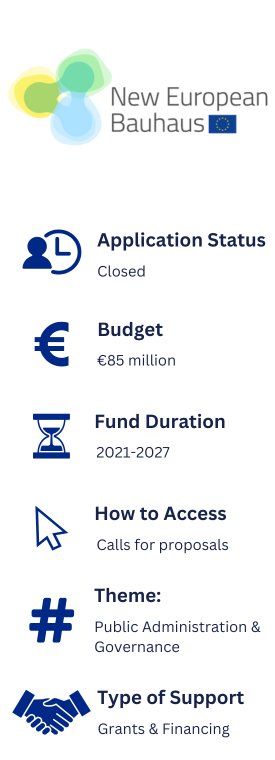
The New European Bauhaus supports a movement of sustainable communities, inclusive dialogues, and purposeful activities. The role of partners is to help build and inspire these communities. At the same time, they act as sounding boards and key interlocutors for the initiative.
Who Can Apply?
Any entity, except for-profit organisations and public authorities, can become an offical partner of the New European Bauhaus. The call for New European Bauhaus partners is permanently open.
More information about the New European Bauhaus, become a partner of the New European Bauhaus and calls for proposals for the New European Bauhaus.
Theme: Access International Markets
Single Market Programme
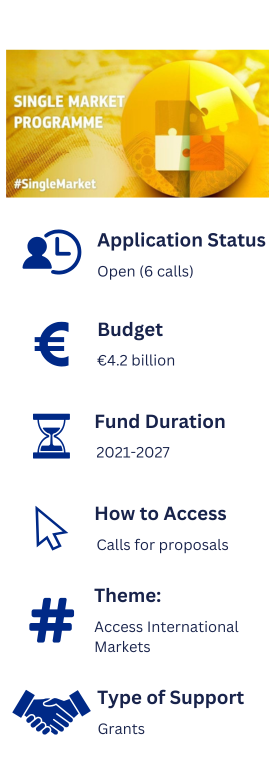
The Single Market Programme (SMP) covers the single market, competitiveness of enterprises (including small and medium-sized enterprises), as well as areas such as plants, animals, food and feed, and European statistics.
Who Can Apply?
- SMEs
- Large Enterprises
- Government
- Cities
- Communities & NGOs
- Knowledge Centres
More information about the Single Market Programme and calls for proposals for the Single Market Programme.
Theme: Public Administration
TAIEX & Twinning
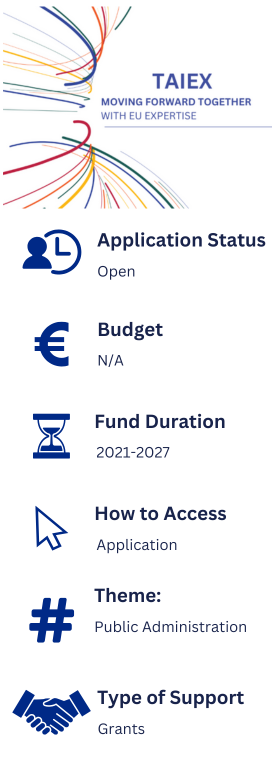
TAIEX is the Technical Assistance and Information Exchange instrument of the European Commission. TAIEX supports public administrations with regard to the approximation, application and enforcement of EU legislation as well as facilitating the sharing of EU best practices. It is largely needs-driven and delivers appropriate tailor-made expertise to address issues at short notice in three ways:
- Workshops: EU Member State experts present specific areas of EU legislation in workshops to a large number of beneficiary officials
- Expert missions: EU Member States expert(s) are sent to the beneficiary administration to provide in-depth advice on the transposition, implementation or enforcement of a specific part of EU legislation
- Study visits: a group of five practitioners from a beneficiary administration take part in a study visit to an EU Member State’s administration
In addition to TAIEX, Twinning is now available to the OCTs, allowing governments to request services through both programs. The two are similar in nature.
More information about TAIEX & Twinning, more information on Twinning, and funding and technical assistance regarding TAIEX & Twinning.
